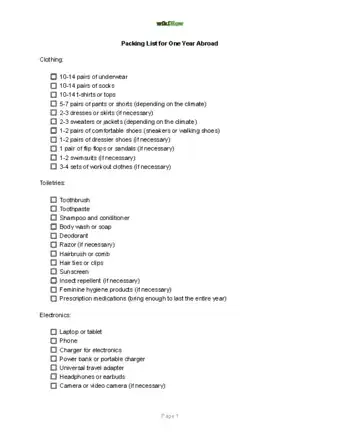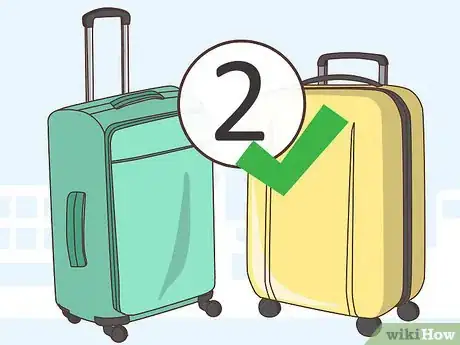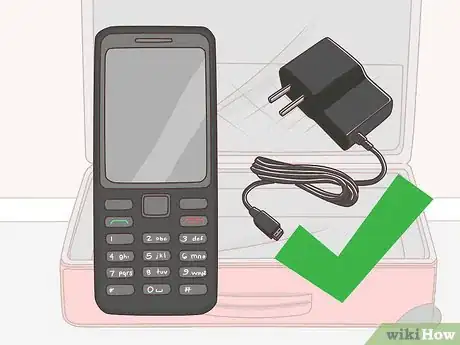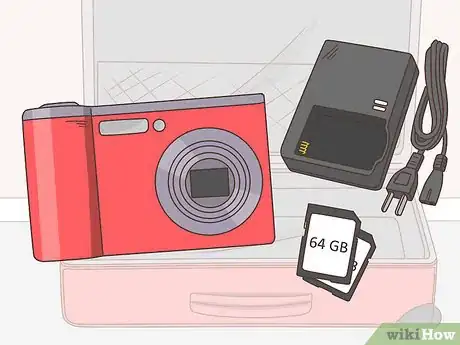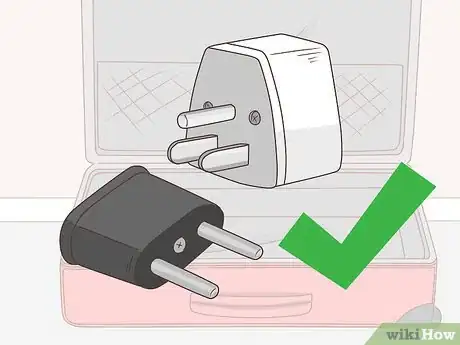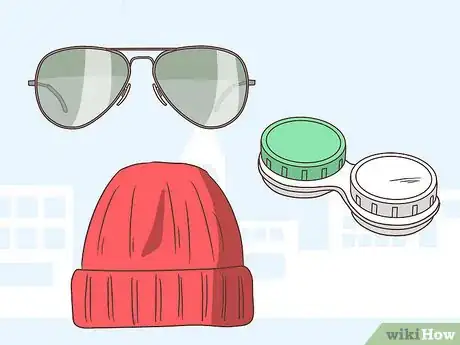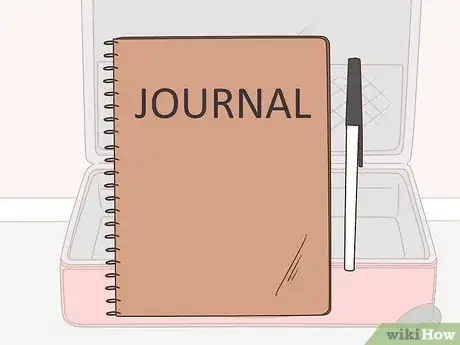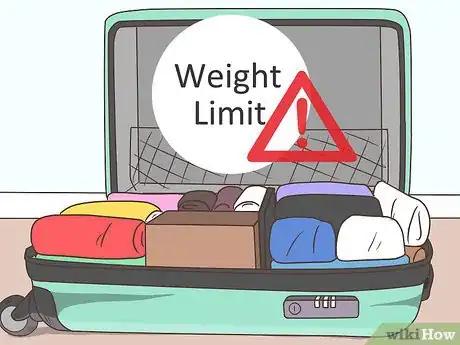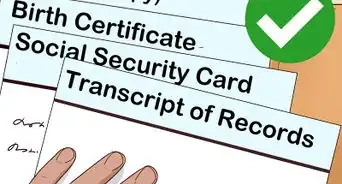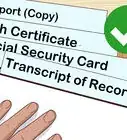This article was co-authored by Angela Rice. Angela Rice is a Luxury Travel Specialist and Co-Founder of Boutique Travel Advisors, a luxury travel advising business in Phoenix, Arizona. Angela specializes in consulting and curating highly customized and unique travel itineraries for clients seeking luxury, group, and multi-generational family travel. Angela studied at Arizona State University and The University of Iowa Tippie College of Business. She has prior consulting experience in accounting and business, which helps her run her business behind the scenes. Angela has been featured in The Washington Post, Reader's Digest, Travel Weekly, USA Today, Travel Market Report, Phoenix Magazine, and MSN. She is also a frequent guest on WBBM News Radio 105.9 FM's Travel Tuesday show.
There are 17 references cited in this article, which can be found at the bottom of the page.
This article has been viewed 29,238 times.
When packing for a year abroad, talk to your host institution regarding what sorts of things you should bring. You’ll definitely need to bring essentials like clothing and shoes. Don’t pack too much and use vacuum bags to compress your luggage if necessary. Much of the packing depends on your personal preferences. Bring money with you – converted into the local currency – so that when you arrive you can pay for taxis, trams, and buy the things you might have forgotten to pack.
Steps
Packing List for One Year Abroad
Choosing Luggage and Packing Clothes
-
1Obtain two sturdy suitcases. You can’t take everything with you when packing for a trip abroad, but you’ll need space for enough clothes and belongings to keep you comfortable throughout your year away from home. It’s reasonable to bring two large suitcases – three would be too many, and one would be too few.[1]
- Alternatively, you can bring a large backpack and a daypack.[2] Use the backpack to carry your essential items – clothes, boots, and so on. Use the daypack to bring things you need when leaving your hotel or hostel like a water bottle, phone, and money.
-
2Pack functional, comfortable everyday clothes. Choose a wardrobe to bring with you based on the climate of the place you’re going and which pieces you’ll wear on an everyday basis.[3] Anticipate what you’ll need, and what will make you feel most comfortable.[4]
- Learn more about the climate and seasonal weather patterns of the place you’re headed and pack your wardrobe accordingly. If you’re headed for the Caribbean, you can probably leave your parka and mittens at home. If you’re studying abroad in Switzerland, on the other hand, you won’t have much use for shorts or flip-flops.[5]
- Don’t forget essentials. You should pack two weeks’ worth of underwear and socks to keep laundry costs down. Include a pair of sturdy and comfortable walking shoes.
- Some of what you bring can be determined by your personal preferences. You might want to bring a favorite set of pajamas, or that t-shirt from your favorite band.
- Be versatile when packing. Look for outfits that would be appropriate in both casual and professional situations. Choose clothing items that match well with many other items.
Advertisement -
3Pack culturally appropriate clothing for school, work, and events. If you’re working, studying, or attending social occasions in another country, you might be considered disrespectful for dressing in a slovenly manner. Choose clothing that is professional and projects the sense that you’re a mature, responsible person. Failing to do so could result in you packing a lot of clothing that ends up serving no use while you’re in-country.[6]
- Do some investigating about cultural mores in the country where you’ll be spending your year abroad. If you have a trip coordinator, ask them about what kinds of clothing is acceptable in the nation you’re headed to.
- Avoid wearing sweatpants, hoodies, and flip-flops to class or work.
- Bring at least one formal outfit in case you have the opportunity to attend a formal event.
-
4Think about what you can do without, and leave it at home. Keep your packing minimal.[7] Lay everything you plan on bringing on the floor and evaluate each item one-by-one. Ask yourself, “Will I get a lot of use out of this? Is there some way I could avoid bringing this?” For instance, if you have three sets of shoes, you might conclude, “I could do with a single pair of shoes in order to pack lighter.”[8]
Packing Electronics
-
1Pack your laptop so you can stay productive and connected to home. When you’re abroad, you’ll likely want to continue checking your email and social media, keeping up with the news, and staying in touch with your family and friends. You also might require a laptop for school or work purposes. Invest in a padded laptop case and bring your laptop along with your other carry-on luggage.[9]
-
2Bring your phone and phone charger. While you’re away, you might need to contact people at home in case of emergency. You’ll also want a portable way to communicate with your host family and your new friends. Purchase an international phone plan ahead of time, or buy a new SIM card for your phone when you arrive. This way, you’ll be able to use your current phone to communicate, even while abroad.[10]
- Some countries offer reduced plans for students and young adults. You can purchase a set amount of data, text messages, and call minutes per month, or you can “top up” your SIM card with additional capacity for texts, calls, and data.
- Many international airports sell SIM cards at shops or kiosks in the arrivals area.
- If an international phone plan is too expensive, consider using an app like Skype or WhatsApp to communicate.
-
3Bring a tablet or an e-reader for portable entertainment. Because you’ll have limited packing space, you certainly won’t be able to bring too many books along. If you’re a voracious reader, bringing a tablet or a reading device like a Kindle is a space-efficient way to bring literature overseas – not to mention your favorite music, films, or TV shows.[11]
- Bring a pair of high-quality earbuds if you want to listen to music and watch movies on your tablet (or your phone).
- Tablets are also great for drawing or playing games on the go.
-
4Pack a camera to capture images of your stay. If you’re satisfied with your phone’s camera, you could forego bringing a digital camera.[12] But if you want higher-quality images, you should think about bringing one along.[13]
- Don’t forget the memory card and charger when you pack your camera.
- Avoid bringing a bulky long-lens camera. Their size makes them hard items to carry on your flight, and their fragility means you should not trust them to baggage handlers.
-
5Invest in an electrical adapter set. Foreign electrical outlets are probably different than the ones you have in your country. Instead of two prongs they might have three, or vice versa. In order to use you phone, laptop, and other gadgets, you’ll need to invest in an adapter set.[14]
- Electrical adapter sets are usually sold as part of a package that contains adapters all international electrical outlet standards. In other words, you won’t need to buy a set for Japan, another for Nigeria, and another for Scotland. Instead, the set will contain interchangeable pieces that you can use as needed in each country.
- They are readily available online and in many hardware stores.
Bringing Accessories and Extras
-
1Pack useful, weather-appropriate accessories. If you wear glasses or contacts, be sure to pack some. If you’re headed to a sunny location, you’ll need sunglasses. You could bring a quality pair housed in a hard-shell case, or wait until you arrive to get some. If the weather will be cold, pack some scarves and hats. If you’re a watch-wearing person, you could wear it abroad, though if you have a phone (or plan on getting a phone), it’s impractical to have a watch.[15]
- If you like wearing makeup, you could pack a small makeup set, too.
-
2Pack all your essential toiletries. Over-the-counter medicines like aspirin and a first-aid kit should be part of your travel pack. You should also pack hygiene products like soap, a brush/comb, deodorant, and at least one month’s worth of feminine hygiene products. Depending on where you’re going, you might want to also pack a roll of toilet paper – it’s not available everywhere.[16]
- Some items like razors and toothpaste might not be allowed on your flight.
- Check the latest travel guides for your nation’s airport security bureau to ensure that whatever you pack won’t cause a problem at the boarding gate.
- Check your local stores for travel sizes of various toiletries, especially toothpaste and soap.
- Don’t pack too many of these. A small toiletries case should be sufficient. You can buy more soap, toothpaste, and so on when you arrive at your destination.
-
3Bring a folder to protect your important documents. If you’re headed abroad as part of a school program, you’ll probably need to bring insurance forms, transcripts, and other university documentation to your host institution. If you’re headed abroad to work, you’ll need to bring criminal background checks and related documents to your boss. If you’re married, you might also need to bring a marriage certificate. A folder or document organizer will be useful for organizing this paperwork in an orderly way.[17]
- You might also want to bring some extra passport photos just in case you need them for a work permit or passport renewal.
- If you plan on driving, you’ll probably want to bring your international driver’s permit.
- Ask your host institution or company what documents you need to bring so you don’t forget anything crucial.
-
4Bring a padlock to keep your personal belongings safe. Travel-sized padlocks are essential for keeping your bag secure. You can use your padlock to secure your belongings in a locker, which many hostels provide. If you’re in a private room in a hotel, you could bind the two zippers on your backpack together with a padlock, making it impossible to open the backpack.
-
5Pack a scrapbook to preserve the memories you’ll make. A scrapbook is the perfect way to collect and organize all your pictures, tickets, and other scraps you collect while you’re making great memories abroad. When you return home, you can share your scrapbook with friends and family who are curious about your travels.[18]
- You can get blank scrapbooks at most arts and crafts shops.
-
6Get a mini dictionary to make communication easier. Travel-sized dictionaries are indispensable for anyone heading abroad for a year. Whether you’re looking for a place to eat or just trying to say “hello,” you’ll be glad you’re armed with a mini dictionary when you head to explore your local surroundings.
- Use the blank space toward the back of the dictionary to write down essential words and phrases like, “How much does it cost?” and “Where is the bathroom?”
-
7Bring some mementos from home to prevent homesickness. If you have a favorite picture of you and your family or a good luck charm that means a lot to you, you should bring it along. A year abroad is a great adventure full of neat opportunities, but having small reminders about where you’re from and who you are can help you avoid missing home.[19]
- Don’t go overboard with mementos from home. You should devote most of your suitcase to space for functional essentials like clothing.
-
8Bring money, exchanged for the local currency. Before you leave your home, visit your local bank and exchange about $500 in your currency into the local currency of wherever you’re spending the next year. That way, when you pass through customs, you’ll be able to pay your taxi to wherever you’re headed and make purchases of things you couldn’t pack (or forgot to pack).
- Place some money in your wallet for easy access, and reserve some – at least $100 – along with your passport in the event that you misplace your wallet.
- Think about investing in a passport/document holder that you can sling around your neck beneath your shirt. That way, your important documents will always be with you.
-
9Bring a journal to record your thoughts throughout the journey. Traveling often inspires introspection and creativity. You’ll need an outlet to focus your energy on rainy days or days when you feel like simply relaxing. Journaling is a great way to express yourself and reflect on your travels when you’re on the road.
-
10
Maximizing Your Packing Space
-
1Use vacuum bags to increase luggage space. Vacuum bags are special bags designed to reduce the volume of your clothes by compressing their total volume. These are especially useful for packing bulky items like coats and bedding. But remember, packing bags will only reduce the size of your luggage, not its weight.[22]
-
2Bring a carry-on bag for your personal items. Your carry-on bag is the one that you’ll be able to bring with you onto your flight. You should pack your carry-on bag full of things to make your trip more pleasant. For instance, you might want to bring your phone, chargers, laptop, a snack bar, a book, or a tablet.[23]
-
3Find out if you need to pack your own sheets. Assuming you’re spending a year abroad for work or study, ask your host institution if you need to bring your own sheets. Often, the answer is that you don’t, but it’s best not to assume one way or the other. The last thing you want to do is find out that you’ve packed your bed set but don’t actually need it.[24]
- If you don’t want to pack an entire sheet set, which can be quite bulky, pack a rolled-up sleeping bag. If it’s small enough, you might even be able to put it in a duffle bag and take it with you as carry-on luggage.
-
4Layer up when en route to save room in your luggage. If you’re headed to a cold climate, wear your big parka on the plane instead of trying to pack it. The same goes for at least one pair of gloves and a winter hat. Anything you wear on the plane will save space and weight in your luggage. You can always take it off and place it in your lap if you get uncomfortable while on board.[25]
Expert Q&A
-
QuestionWhat should you keep in mind if you are traveling on a budget?
 Angela RiceAngela Rice is a Luxury Travel Specialist and Co-Founder of Boutique Travel Advisors, a luxury travel advising business in Phoenix, Arizona. Angela specializes in consulting and curating highly customized and unique travel itineraries for clients seeking luxury, group, and multi-generational family travel. Angela studied at Arizona State University and The University of Iowa Tippie College of Business. She has prior consulting experience in accounting and business, which helps her run her business behind the scenes. Angela has been featured in The Washington Post, Reader's Digest, Travel Weekly, USA Today, Travel Market Report, Phoenix Magazine, and MSN. She is also a frequent guest on WBBM News Radio 105.9 FM's Travel Tuesday show.
Angela RiceAngela Rice is a Luxury Travel Specialist and Co-Founder of Boutique Travel Advisors, a luxury travel advising business in Phoenix, Arizona. Angela specializes in consulting and curating highly customized and unique travel itineraries for clients seeking luxury, group, and multi-generational family travel. Angela studied at Arizona State University and The University of Iowa Tippie College of Business. She has prior consulting experience in accounting and business, which helps her run her business behind the scenes. Angela has been featured in The Washington Post, Reader's Digest, Travel Weekly, USA Today, Travel Market Report, Phoenix Magazine, and MSN. She is also a frequent guest on WBBM News Radio 105.9 FM's Travel Tuesday show.
Luxury Travel Specialist If you are traveling on a budget, make sure that you do not compromise the experience due to a low budget. When you are already investing so much in the ticket, think about the overall value of the trip.
If you are traveling on a budget, make sure that you do not compromise the experience due to a low budget. When you are already investing so much in the ticket, think about the overall value of the trip. -
QuestionWhat are the things you should know before traveling to a place?
 Angela RiceAngela Rice is a Luxury Travel Specialist and Co-Founder of Boutique Travel Advisors, a luxury travel advising business in Phoenix, Arizona. Angela specializes in consulting and curating highly customized and unique travel itineraries for clients seeking luxury, group, and multi-generational family travel. Angela studied at Arizona State University and The University of Iowa Tippie College of Business. She has prior consulting experience in accounting and business, which helps her run her business behind the scenes. Angela has been featured in The Washington Post, Reader's Digest, Travel Weekly, USA Today, Travel Market Report, Phoenix Magazine, and MSN. She is also a frequent guest on WBBM News Radio 105.9 FM's Travel Tuesday show.
Angela RiceAngela Rice is a Luxury Travel Specialist and Co-Founder of Boutique Travel Advisors, a luxury travel advising business in Phoenix, Arizona. Angela specializes in consulting and curating highly customized and unique travel itineraries for clients seeking luxury, group, and multi-generational family travel. Angela studied at Arizona State University and The University of Iowa Tippie College of Business. She has prior consulting experience in accounting and business, which helps her run her business behind the scenes. Angela has been featured in The Washington Post, Reader's Digest, Travel Weekly, USA Today, Travel Market Report, Phoenix Magazine, and MSN. She is also a frequent guest on WBBM News Radio 105.9 FM's Travel Tuesday show.
Luxury Travel Specialist Do sufficient research before planning your trip. Find out about the weather of the destination. Pack your belongings accordingly. Try to gain enough knowledge about the place and decide whether you need binoculars and a camera.
Do sufficient research before planning your trip. Find out about the weather of the destination. Pack your belongings accordingly. Try to gain enough knowledge about the place and decide whether you need binoculars and a camera.
References
- ↑ http://thestudyabroadblog.com/study-abroad-packing-list-2-2/
- ↑ Angela Rice. Travel Specialist. Expert Interview. 18 September 2020.
- ↑ Angela Rice. Travel Specialist. Expert Interview. 18 September 2020.
- ↑ http://thestudyabroadblog.com/study-abroad-packing-list-2-2/
- ↑ http://thestudyabroadblog.com/how-to-pack-two-suitcases/
- ↑ https://www.gooverseas.com/blog/what-not-to-pack-while-studying-abroad
- ↑ Angela Rice. Travel Specialist. Expert Interview. 18 September 2020.
- ↑ http://www.transitionsabroad.com/publications/magazine/0211/ricksteves_packlighttravelhappy.shtml
- ↑ https://globalgraduates.com/articles/what-to-pack
- ↑ https://www.gooverseas.com/blog/how-to-find-the-best-cell-phone-plan-for-study-abroad-in-europe
- ↑ http://thestudyabroadblog.com/top-10-electronics/
- ↑ https://globalgraduates.com/articles/what-to-pack
- ↑ Angela Rice. Travel Specialist. Expert Interview. 18 September 2020.
- ↑ https://globalgraduates.com/articles/what-to-pack
- ↑ http://oakland.abroadoffice.net/res/saoffice_static_pages/2068/updated%20Study%20Abroad%20Packing%20List.pdf
- ↑ http://thestudyabroadblog.com/study-abroad-packing-list-2-2/
- ↑ https://globalgraduates.com/articles/what-to-pack
- ↑ https://globalgraduates.com/articles/what-to-pack
- ↑ http://www.reachtoteachrecruiting.com/blog/your-life-in-a-bag-how-to-pack-for-a-year-abroad/
- ↑ http://thestudyabroadblog.com/how-to-pack-two-suitcases/
- ↑ http://www.reachtoteachrecruiting.com/blog/your-life-in-a-bag-how-to-pack-for-a-year-abroad/
- ↑ https://globalgraduates.com/articles/what-to-pack
- ↑ http://thestudyabroadblog.com/how-to-pack-two-suitcases/
- ↑ http://thestudyabroadblog.com/how-to-pack-two-suitcases/
- ↑ http://www.hostelbookers.com/blog/travel/packing-tips/
